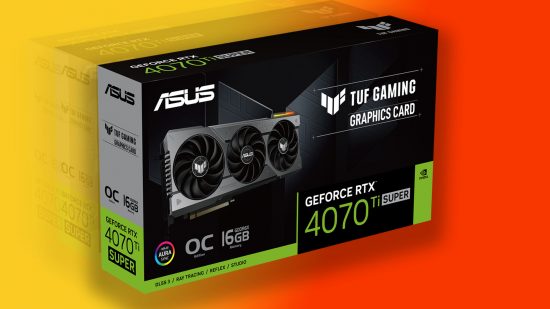The latest Nvidia RTX 4070 Ti Super benchmarks have just leaked, and they show that this new GPU isn’t far off the pace of the original RTX 4080. On the face of it, that’s a stunning feat for a graphics card that’s slated to cost just $799 when it launches next week, but let’s also remember that the Nvidia RTX 4080 was also massively overpriced when it launched.
Like the RTX 4080, the new RTX 4070 Ti Super has 16GB of VRAM at its disposal, compared with just 12GB on the original RTX 4070 Ti. Not only that, but this new Nvidia GPU will also offer more CUDA cores, RT cores, and Tensor cores than its predecessor, which at a price of $799 could make it a contender for our best graphics card guide.
We’re now able to get a glimpse of how this new GPU will perform, thanks to a set of benchmark results that have appeared in the Geekbench browser. This is a synthetic compute benchmark, based on using GPU power for applications rather than games. It produces an overall score, so it doesn’t show any frame rates in real games, but it does give an indication of the RTX 4070 Ti Super performance in comparison with the rest of the current Nvidia GPU stack.
The GPU was benchmarked in a system based on an Intel Core i9-14900K with 32GB of 7,200MHz DDR5 memory, and the results browser shows the GeForce RTX 4070 Ti Super running at a 2,640MHz clock speed. In the OpenCL test, the RTX 4070 Ti Super system scored 229,043, which is a 10.8% increase over the average score of 206,564 for the original RTX 4070 Ti. There’s also only a 4.8% increase between this score and the RTX 4080 average of 240,076.
Meanwhile, two results are given for the Vulkan test, one of 192,032 and one of 222,435, and we can only assume that the GPU was significantly overclocked to achieve the latter, as it’s significantly quicker than the 208,667 average result for the RTX 4080. Sticking with the lower result, this is 8.8% quicker than the original RTX 4070 Ti, and there’s a similar increase of 8.7% when stepping up to the RTX 4080
We obviously can’t directly translate these results into gaming frame rates – you’ll have to wait for our full RTX 4070 Ti Super review next week for those – but in terms of raw shader performance, it looks as though the RTX 4070 Ti Super will be closer to the RTX 4080 than the original RTX 4070 Ti.
This is good news for gamers, as it means we can finally get this level of performance without having to spend well over a grand to get it. In the meantime, make sure you read our new Nvidia GeForce RTX 4070 Super review, where we put the first of Nvidia’s new Super graphics cards to the test.
